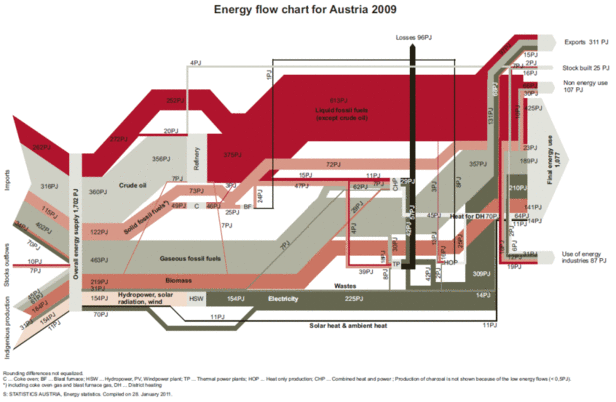Difference between revisions of "Austria Energy Situation"
***** (***** | *****) m |
***** (***** | *****) m (Katharina Wiedemann moved page Austria Country Situation to Austria Energy Situation without leaving a redirect) |
(No difference)
| |
Revision as of 12:11, 17 June 2013
Overview
| Republic of Austria | |||
| |
| ||
|
Capital |
Vienna(48°12′N 16°21′E) | ||
|
Official language(s) |
German | ||
|
Government |
Federal Parliamentary republic | ||
|
President |
Heinz Fischer | ||
|
Chancellor |
Werner Faymann (SPÖ) | ||
|
Total area |
83,855 km2 | ||
|
Population |
8,414,638 (2011 estimate) | ||
|
GDP (nominal) |
$405 billion | ||
|
GDP Per capita |
$48,350 | ||
|
Currency |
Euro (EUR) | ||
|
Time zone |
CET (UTC+01) | ||
|
Calling code |
+43 | ||
Energy situation
Primary energy consumption
Renewable Energies[1]
Mandatory targets set by the Directive on the Promotion of the use of energy from renewable sources
- 34 % share of RES on the gross final energy consumption of energy in 2020.
- At least 10% share of renewable energy in final consumption of energy in transport by 2020.
Indicative Target set by the RES- electricity European Directive from 20015
- 78.1 % share of RES on gross electricity consumption by 2010.
Indicative Target set by the European Biofuels Directive from 2003
- Biofuels consumption of 5.75% of final energy consumption of petrol and diesel use for transport in 2010.
Legal Framework on the Promotion of renewable energies in Austria
- Green electricity Act
- Subsidy Directive
- Green Electricity Regulation 2011
Electricity situation
Supply
Demand
Energy Efficiency
see report by the Austrian Energy Agency on Energy Efficiency Policies and Measures in Austria (2009)
Policy framework, laws, regulations - recent developments
Energy Strategy[2]
In 2010, the two ministries (economy and environment) presented, after a lenghty stekeholder process, the Austria Energy Strategy (2010), which is founded on three principles:
- Security of energy supply
- Energy efficiency
- Renewable energies
On the basis of these principles, Austria’s energy strategy is primarily directed at enhancing energy efficiency at every level where energy is supplied and consumed. Furthermore, it is necessary to improve security of supply and crisis provision for every source of energy and to strive to achieve as high a degree of energy autonomy as possible, while at the same time taking into account cost efficiency.
also see IEA (2007) report: Energy Policies of IEA Countries - Austria Review 2007
Institutional set-up
Further Reading and Links
Statistics on energy by Statistik Austria
Austrian Federal Ministry for Environment
Austrian Federal Ministry for Economy, Families and Youth
Austrian Federal Ministry for Transport, Innovation and Technology




















